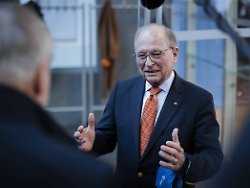Ischinger regrets the cancellation
MSK boss wants to talk to instead of about Russia
02/14/2022, 12:55 p.m
The topics of Ukraine, Russia and NATO are priorities at the Munich Security Conference. However, Russia will not be represented. Conference boss Ischinger fears that the event will degenerate into a purely transatlantic forum.
In view of the Ukraine crisis, the head of the Munich Security Conference (MSK), Wolfgang Ischinger, would like Russia to send an official representative to the conference next weekend. The fact that Moscow has canceled so far is “regrettable,” said Ischinger in Berlin. But he will stay “on the ball”. “We will try everything to get an authorized Russian spokesman to Munich.”
Ischinger resolutely rejected accusations from Moscow that the MSK had degenerated into an “anti-Russian, or at least purely transatlantic, forum”. Russian representatives could have the same stage in Munich as US representatives, for example. “I hope that we can talk not only about Russia but also with Russia at the weekend in Munich,” said Ischinger.
According to the organizers, 35 heads of state and government, around a hundred ministers and the heads of the UN, NATO and the EU will take part in the conference, which begins on Friday. UN Secretary-General António Guterres will open the three-day meeting. Chancellor Olaf Scholz (SPD) will also take part. US Vice President Kamala Harris has also announced her presence.
With a view to the Russian troop deployment on the border with Ukraine, Ischinger said he still considered war to be inevitable. “I hope I’m not being naïve,” he added.
No retreat from non-aligned policies
According to Western sources, Russia has massed more than 100,000 soldiers on the border with Ukraine in recent months. The US government has repeatedly warned that Russia could attack the neighboring country “at any time”. Moscow denies any plans to attack, saying it feels threatened by NATO.
Ischinger openly regretted that NATO had concretely laid down the accession prospects for Ukraine and Georgia in 2008, albeit without specifying a date. However, the policy of non-alignment cannot be abandoned. Instead, the ex-diplomat proposed guaranteeing Russia that no large contingents of foreign troops and no nuclear weapons would be stationed in potential new NATO countries. But “of course” the Russian side would then have to give such a guarantee. He’s thinking of the Russian exclave of Kaliningrad, for example.
